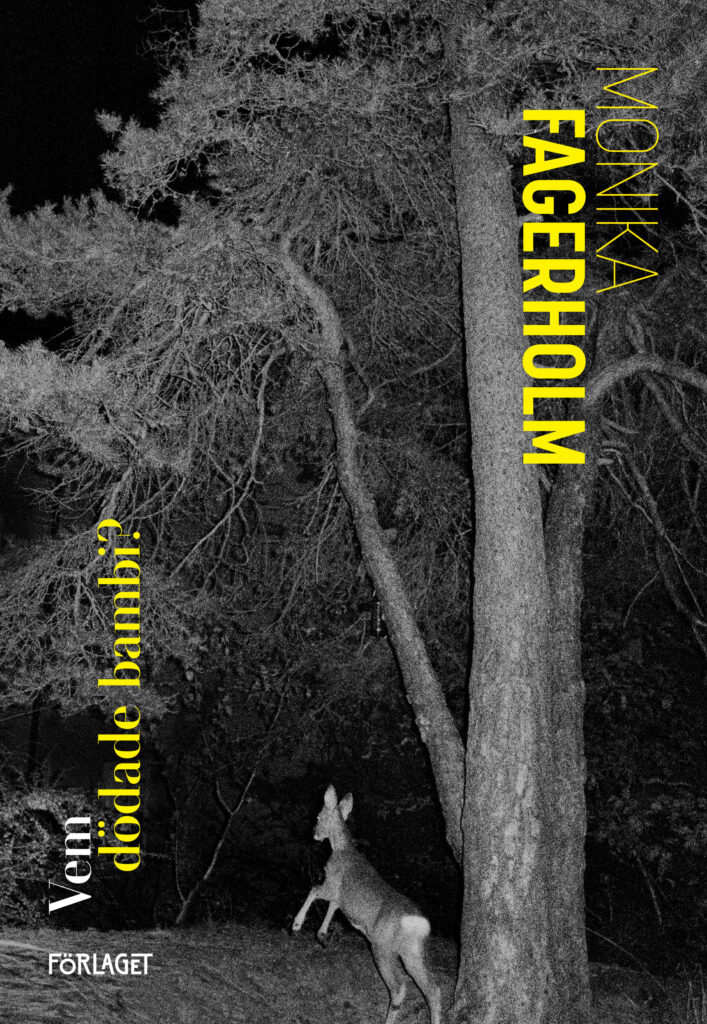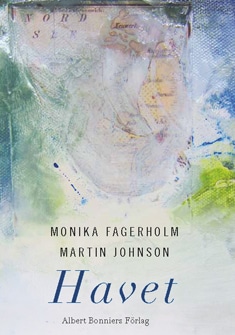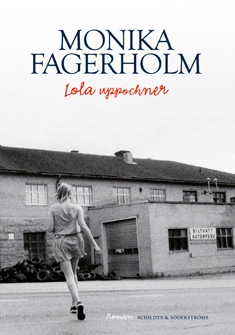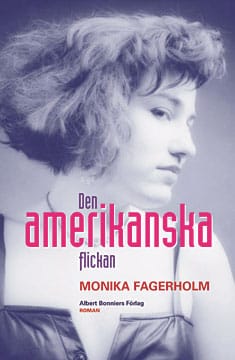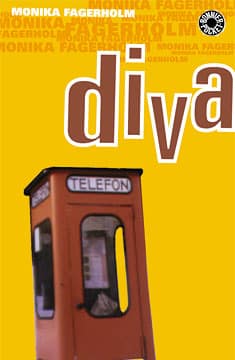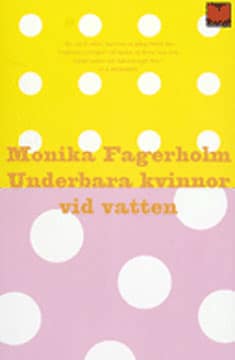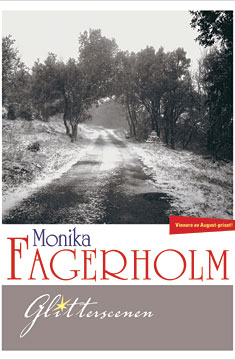
Glitterscenen The Glitter Scene
The context from which this novel arises lies in the strange and unlikely friendship between two lonely women, the recurring history of a small town, and the deadly attraction of fantasy, play and illusion. The Glitter Scene is the highly anticipated finale of Finnish-Swedish writer Monika Fagerholm’s diptych The End of the Glitter Stage. The first part, The American Girl, was unanimously praised and awarded with The August Prize. The Glitter Scene continues the mysterious saga of a small town on the Finnish coast and its exotic inhabitants. The novel takes us into the 21st century, and shows the complex and unrelenting consequences of the areas past. In a rich and highly original prose, Fagerholm leads us through several generations of women that are surrounded by love, abandonment and death.
“Out of The American Girl’s elusive mysteries of time and creepy teenagers-in-trouble, Fagerholm triumphs with its sequel, The Glitter Scene, mining the not-quite-real or the too real evidence of sorrow that we forget we live by.”
—Terese Svoboda, author of Bohemian Girl
Awards
| Shortlisted for the Nordic Council Literature Prize The Nordic Countries | 2010 |
| Shortlisted for the Runeberg Award Finland | 2010 |
Reviews
-
“A fascinating novel, where there is no difference between fairies and witches, and where beauty lives side by side with cruelty and madness. Simply amazing.”
-
“With the sequal [to The American Girl] as now finally been published, Monika Fagerholm´s authorship as someone who challenges the reader´s sensibility by telling a journey on the mythical aspects of life is reinforced.”
-
“The Glitter Scene is a tremendous reading experience. It stays in your mind and continues to shine. After reading the book you feel as though you have moved into life's unfathomable core.”
-
“Despite its gloominess, The Glitter Scene is a sweet and humorous novel. Fagerholm depicts youth without fabrication but with tenderness and insight. The Glitter Scene is a multi-layered and rich novel but regardless of its wealth, it is an extremely intensive reading experience. It is a rare book and it is difficult to take on another one afterwards.”
-
“With all its darkness, its experimentation with language and its unanswered ethical questions, for me The Glitter Scene worked as a really fundamental mood-lifter. It added color to the days I read it. It sparked my imagination and challenged my mind. All that it demanded from me, it returned tenfold in all its soiled splendor.”
-
“I imagine Monika Fagerholm’s sentences as worms, crawling around each other in an angler’s glass jar. Every sentence wiggles and winds, really stretches the patience of the average reader and yet hits the mark. Really hits the mark. Creates the same suspense, if not more. Creates the same absolute desire to read, the same irrefutable drive, and the same simple childish excitement to devour, like any other thriller. /…/ The fact is that while reading The Glitter Scene, I caught myself shivering from time to time. The really unusual type of shiver, which only appears when you touch on the essence, or the meaning, of literature itself. For me, Monika Fagerholm remains one of the truly great authors.”
-
“[Fagerholm] is not always easy to follow and demands her readers’ attention. But here, her musical language serves as a guide. There is not a single routine sentence in her prose; it is always emotionally present and never succumbs to coolly intellectual abstraction. And I think that may be the main reason why an author as "difficult" as Fagerholm is loved by so many. There is simply no one else who writes like her.”
-
“Suspenseful, capricious reading that isn’t like anything else.”
-
“…incredibly memorable characters. In particular Maj-Gun is a magnificent creation, so full of misdirected vitality that the pages barely can retain her. Fagerholm has expressed her admiration for William Faulkner, and it’s not hard to see similarities between the two. /…/ It is great, cruel and sad.”
-
“In The Glitter Scene, form and content, style and plot, setting and characters are in absolute harmony. /…/ Fagerholm varies her themes, like a composer. She allows melancholy and threatening loops to return again and again, she creates staccato effects with shattered sentences and words, and she continually surprises with a "note sequence" in the sentence structure that severs every ingrained notion. The result is a sensual prose that moves within me during the reading, just as it utterly naturally inhabits its own body.”
-
“Like a shattered kaleidoscope. It is a polyphony of voices, disintegrated, chanting. But in these narratives, these competing voices, there exists the shards that carefully put together provide the explanation to the tragedy, the tragedies. Because just as in the folk song, death is always present. The rhythm is Fagerholm’s own. The sentence structure too: it abides to her own laws, blends colloquial speech, Bible quotes, ritual repetitions, an onomatopoetic playfulness. Sometimes thoughtfully, sometimes impetuously, but always like a song.”
-
“The Glitter Scene balances on the ice cold tones of David Lynch and the myth of Orpheus and Eurydice. /…/ Soon, the seemingly unrestrained mass of words develops into a magnetic thriller with fascinating traits. The compact staccato presentation of the intrigue contains several elegant shifts between persons and decades. And the roundabout arrangement of words becomes both beautiful and suspenseful, as soon as the wild form has opened up. The Glitter Scene is a remarkable story of guilt, revenge and betrayal. In conclusion, it is a beautiful novel, where the distance between blissful fantasy and grim reality never is very far.”
-
“My allusion to Twin Peaks is no coincidence, and I don’t think the David Lynch quote that opens the novel is either. The ghost of Laura Palmer hovers over the American girl and her woeful sisters, and there are certainly additional connections between Fagerholm and Lynch. /…/ But also: the utterly luminous characters, larger than life, in fact most of them rather nutty, and impossible to forget.”
-
“Set 37 years after the events of [The American Girl], the companion novel brings readers up to date with the characters’ lives and sheds additional light on a central mystery. /…/ Fagenholm adopts a dense, experimental style to tell this story, one that uses a great deal of repetition, includes many incomplete sentences and clauses, and delivers the same information from several points of view. Structure, too, is complex and interesting. /…/ The novel contains four sections, each focusing on a different character, whose story is told from differing perspectives. /…/ For literary readers and fans of its predecessor.”
-
“Fagerholm writes in a dreamlike, lyrically soaring prose.”
-
“Monika Fagerholm writes an almost lyrical prose, in which plot-wise linearity is suspended. The result is a superior novel that courageously defies established literary style and mischievously plays with genre conventions.”
-
“The Glitter Scene is one of the strongest novels I’ve read this year.”
-
“I have been waiting forThe Glitter Scene because I have longed for the Finnish Coastland, for Monika Fagerholm’s prose and mental landscapes. A literature that creates a new consciousness, another kind of knowing, that goes deeper than intellectual understanding. There are truths that we can grasp without understanding them…I love and am amazed by the language, the intrigue, the entire lovely lot of it.”
-
“Monika Fagerholm has a creative inspiration like no one else…There is a lot to be amazed by and stop and think about in Monika Fagerholm’s story. It is rich with ideas, often written with a great deal of humor and an empathy factor that is constantly high.”
-
“In an interview Fagerholm has said that the storyline comes to her in images. The book cover shows a crushingly beautiful photography of a dirt road at dawn. She then transcribes her images into a story. In this work she has been guided by music, primarily by Mahler’s ninth symphony. In a closing comment of the novel, Monika Fagerholm thanks Lena von Bonsdorff for an article about “music that breaks down intellectual defenses”. One can see that Fagerholm has used her sources of inspiration in this way, to deconstruct plans and rationalizations. But it is first after finishing the book that one can see how brilliantly and naturally Fagerholm has laid out the pieces and put them together into a new, sparkling whole, which terrifies and conquers. This is a novel that one can return to after finishing it, to reread it in parts.”
-
“The musical language in The Glitter Scene contains all that is needed for readers to dare to explore their emotions. Rhymes, prattle, silliness, naïve repetitions, and reminiscences of refrains from suggestive and sorrowful folk songs… How should The Glitter Scene, this myth, elegy, this thriller about murder and suicide and grief, this linguistic adventure best be read? I think: humming, smiling and whimpering.”
-
“The Glitter Scene balances on the ice-cold tones of David Lynch and the myth about Orpheus and Eurydice. The book is a freestanding sequel to The American Girl, which was awarded the 2005 August Prize. Fagerholm is a remarkable storyteller. She doesn’t focus on the individual characters’ essence or the dramatic curves of the separate episodes. Instead, atmosphere reigns, but all the rest springs forth with the rhetoric nonetheless. Pretty soon, the seemingly uncontrolled mass of words develops into a magnetic thriller with fascinating traits. The intrigue’s compact staccato presentation reveals several elegant turns between persons and decades. And the roundabout arrangement of the words becomes both beautiful and suspenseful, as soon as the wild form has opened up. The Glitter Scene is a weird and wonderful story about guilt, revenge and betrayal. In all, it’s a beautiful novel, where the distance between delightful fantasy and bitter reality is never very far.”
-
“It is how the language transforms us, how one can brace oneself against it to become someone else, that makes the Fagerholmian storytelling so extraordinary.”
-
“How it makes me feel: bewildered, impressed, sometimes irritated and confused. Then I think: GENIUS. Monika Fagerholm, a literary GENIUS. Presumably. And I fell that way because her style is difficult and complicated but singular and NEW, and in a significant way RICH. I never get the feeling that Fagerholm is cocooned in her formidable form of experiment. No, this text stubbornly communicates, insists, prattles, chants and hums, and is determined to get there. But on new roads, in innovative ways. Monika Fagerholm has created a monumental, epic novel in two parts, collectively called The End of the Glitter Scene. Whatever you do. Do. NOT. Miss. It.”
-
“When Monika Fagerholm publishes novels her readers never have to be disappointed. Monika Fagerholm writes reliably – not only is the craftsmanship solid, thorough and genuine with every word right on target; the plot is splendidly intricate.”
-
“A very rich and multifaceted novel, suggestive and fascinating, an evil and tender saga that swells into something larger than reality and at the same time is exceedingly real.”
-
“Monika Fagerholm takes her readers on a dizzying, vertiginous journey along separate time planes… Fagerholm manages the difficult task of delving deep into metaphysics, sensuality and landscapes of the soul without losing the distance of a skillful storyteller. I am in awe of the individually chiseled archetypal figures…It is a grand, dissecting novel with thousands of layers, in which mankind’s entire spectrum of searching for security, love and some kind of answer to the riddle of why we are so afraid of each other, simultaneously opens up and is closed forever.”
-
“With the same inimitable style as in the previous novel, Monika Fagerholm opens up a dizzying world full of secrets, lies, fantasies, betrayal, guilt, grief and tragedy. It is an impressive construction, stylistically consistent, full of whims, humorous and sharp insights. It is intense and compelling, full of wisdom that I want to pick out as quick-witted aphorisms.”
-
“…it is this brilliance and warmth that, apart from Fagerholm’s delightful language and very distinctive take on the story, is the great benefit of The Glitter Scene.”
-
“Monika Fagerholm's diptych is an astounding novel about the essence of storytelling and its persistent complexity in regards to the sentence structure's distinctive Finnish-Swedish character. The Nordic Council Literary Award benefits from turning their gaze towards our neighboring country’s dignified strangeness.”
-
“Finnish writer Monika Fagerholm is one of the greatest voices in Nordic literature.”
-
“Finnish writer Monika Fagerholm has written a dark and kaleidoscopic novel about a cursed youth that is reminiscent of David Lynch's movies. /…/ In Monika Fagerholm's hands the fiction of teenagers becomes a dark, complicated but still graceful odyssey; she raises the genre to poetic heights. /…/ Monika Fagerholm's astonishingly modern voice is similar to that of Sofi Oksanen and Sara Stridsberg.”
-
“An original and poetic novel about the mystery around the disappearance of a young girl. /…/ The desires and disorders of young people are reflected through the story.”
-
“This book is an utterly fascinating dark novel. /…/ With a unique strength, Monika Fagerholm portrays the vulnerability of teenagers, particularly that of young girls constantly flirting with madness. /…/ In this novel, love and annihilation are dangerously close to each other.”
-
“Monika Fagerholm’s writing always has a dreamlike and misty style.”
-
“The Glitter Scene is both a demanding and riveting read, and delightfully so… folktales and recurrences are the fundamental elements of her language. It creates a singular suggestive pull and a unique kind of poetry in the novel, which builds up under the sorrow and tension that arises in the text… Filled with stories of guilt, betrayal, death, myths and truths, The Glitter Scene is what I would call a blockbuster with high literary qualities.”
-
“These haunted characters reveal the effects of a tragedy in a small community… The conclusion of The American Girl narrative will delight fans of the series.”
-
“[The protagonist Johanna] sets out to unravel her family history, the identity of her mother, and the dark secrets long buried with her father. In the process of opening closed doors, others in the community reflect back on the town’s history, on their youth, and on the dreams that play in their minds. Soon a new story emerges, that stirs up Johanna’s greatest fears, but ultimately leads to the answers she is searching for. The Glitter Scene is a riveting mystery that explores the roles of truth and myth, reality and fiction, and the repercussions of family secrets.”
-
“The American Girl. The Boy in the Woods. The Angel of Death. Like the refrain of a song, these phrases are repeated throughout Monika Fagerholm's dark coming-of-age novel, The Glitter Scene. /…/ The characters flirt with madness, sexuality, and secrets. /…/ [The elliptical storytelling] is ultimately effective in showing the consequences of an event that has reverberated for almost four decades. In the end, what happened to the American Girl is handily revealed; the Boy in the woods and the Angel of Death are blended together with family blood.”
-
“Monika Fagerholm is currently considered one of Scandinavia's rising stars. In The Glitter Scene she seeks to expand the boundaries of the traditional detective novel. The mysterious death of a young girl in the 1960's still troubles the inhabitants of Finlands coastal region.”
- Author
-
 Monika Fagerholm
Monika Fagerholm
- Published
- 2009
- Genre
-
- Literary
- Pages
- 407
- Reading material
Swedish edition
English edition
French edition
- Rights sold
-
Albania, Morava
Denmark, Tiderne Skifter
Finland, Söderströms (Swedish)
Finland, Teos (Finnish)
France, Stock
Netherlands, De Geus
Norway, Oktober
Sweden, Albert Bonniers
US, Other Press (World English)
